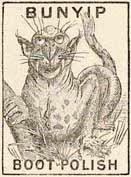FOR REASONS perhaps best explained by sleep researchers or
shrinks, slumber’s lifting veil this morning stopped half way up to strand a
drowsy Bunyip in that delightful realm of semi-conscious reveries and random,
silly thoughts. The fetching Maureen from the golf club sometimes figures at
these moments, but alas, not today. Rather than a keen instructor’s pleasure at
guiding the recent divorcee’s legs to a practical spread and polishing her grip
for the sweeter shot, it was the far less appealing phantasm of our Prime
Minister that bounced about the pillow to the unlikely accompaniment of the
poet John Milton – very strange combination indeed.
The author of Paradise Lost had a problem with women,
as every primary schooler knows, and poured much of his angst at a
short,embarrassing and unhappy first marriage into Samson Agonistes.
Could that be at the root of a subconscious connection, the link between a man
scarred upon the marital couch and the modern woman who has thrashed about on
the beds of so many others?
Then, over coffee and a crumpet, a double revelation!
It was Milton who railed in Areopagitica against censorship, an obvious link
to the shrew who would, and probably will, impose further limits and
restrictions on free speech. And there was more when memory dredged up a snatch
of Agonistes -- a lovely bit wherein
Milton taps the nautical to introduce Delilah, who sails into his hero’s heart
beribboned and full-breasted as a square rig before the wind.
But who is this, what thing of sea or land,--
Female of sex it seems,--
That so bedeck'd, ornate, and gay,
Comes this way sailing
Like a stately ship
Of Tarsus, bound for th' isles
Of Javan or Gadire,
With all her bravery on, and tackle trim,
Sails fill'd, and streamers waving,
Courted by all the winds that hold them play,
An amber scent of odorous perfume
Her harbinger?
Readers are asked to forgive the indulgence of this post. It
was a strange dream and demanded at least some attempt at an explanation.

Ah, yes, a golden age, when Europeans sailed in fine ships to the far side of the world, and vied for dominion. It was a matter of chance which one of them would establish and administer this antipodean continent. No Centrelink then, and idle lurkers in waterfront taverns might be press-ganged into service before the mast rather than given legal aid to make a case for better upholstered unemployment.
ReplyDeleteThe name Macquarie, honoured in many ways and a reminder of colonial times, has itself been press-ganged in a new sense. It has fallen from its pedestal of learning, to now reside in the bilges, in the company of low-life scoundrels of the discoloured media.
Yes Blogstrop. Along with many other good things that have been so sullied.
DeleteProf, those letter id thingys are a pain in the butt, really. Do they have to be so indistinct?
ReplyDeleteOh, Bunyip, Sir. I am, at times, a very indulgent lady. But do remind me, a golfing neophyte indeed, in the eyes of some an absolute virgo intacta in that arena, never to let you demonstrate to me the intricacies of that game, for fear that in such assistance and pursuit I may end up as Ariel in a strangely spirited place, far out to sea, "To answer thy best pleasure; be't to fly,...."
ReplyDeleteLet me quote Tennyson as a further illustrative:
His broad clear brow in sunlight glow'd;
On burnish'd hooves his war-horse trode;
From underneath his helmet flow'd
His coal-black curls as on he rode,
As he rode down to Camelot.
From the bank and from the river
He flash'd into the crystal mirror,
'Tirra lirra,' by the river
Sang Sir Lancelot.
She left the web, she left the loom,
She made three paces thro' the room,
She saw the water-lily bloom,
She saw the helmet and the plume,
She look'd down to Camelot.
Out flew the web and floated wide;
The mirror crack'd from side to side;
'The curse is come upon me,' cried
The Lady of Shalott.
..............
Hear a carol, mournful, holy,
Chanted loudly, chanted lowly,
Till her blood was frozen slowly,
And her eyes were darken'd wholly,
Turn'd to tower'd Camelot.
For ere she reach'd upon the tide
The first house by the water-side,
Singing in her song, she died,
The Lady of Shalott.
..............
Who is this? and what is here?
And in the lighted palace near
Died the sound of royal cheer;
And they cross'd themselves for fear,
All the knights at Camelot:
But Lancelot mused a little space;
He said, 'She has a lovely face;
God in his mercy lend her grace,
The Lady of Shalott.'
The Hairy Irish Ape calls me his Delilah, he is undone, as he most definitely should be. :)
I sail in many winds in dreams and wild poems though Prof and under many names. A ship in the night indeed.
An older admirer once wrote of me: 'Tonight Elizabeth's elegance is shed. She sits legs agape in a shining grey dress in her attic eyrie, reading sixteen hidebound volumes of seventeenth century sermons, in the casement window by the harbour as the rain spills in." I remember him fondly. The volume was Paradise Lost, with Dore lithographs.
It must be this weather Prof, with the parlous state of the nation preying even on our fantasies. Or is a more mundane sort of curse is about to come upon me? Da Ape's cyclical theory of all things female, once again.
Ah, Lizzie! If not for that Irish Ape of yours, such a tour I could show you. A golf lesson, a trip to the mooring and an afternoon's rocking on the tide.
ReplyDeleteDo let me know if he ever gives you reason to be done with him
Er
ReplyDeleteAny right minded person having dreams featuring gillard (and also not calling them nightmares), would be in need of some kind of help!